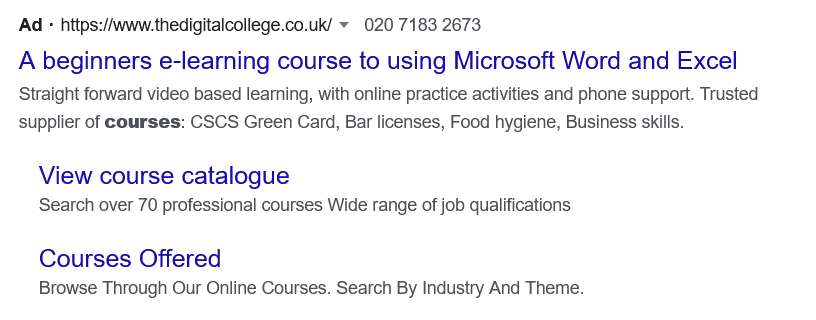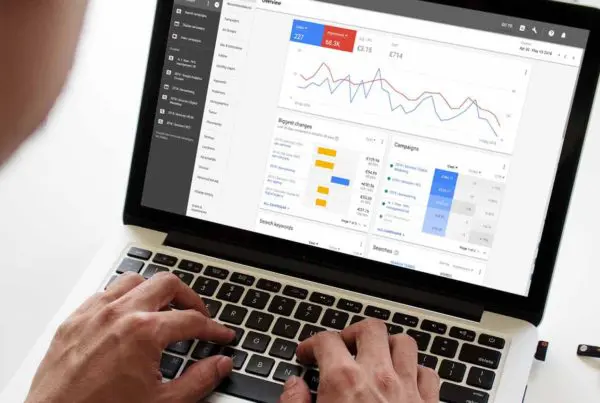Is your business constantly evolving? Are you tired of endlessly updating your Google Ads search campaigns? You’re not alone. In fact, it’s such a common problem Google has created an ingenious fix. It’s called Google Dynamic Search Campaigns (also known as Dynamic Search Ads or DSAs).
You may have heard of the service before. They’re widely used – but there’s a lot of confusion about what Google DSA campaigns are and when to use them.
That’s where I can help.
Today, I will be diving into dynamic search campaigns, explaining what they are, how they work, and when to use them. I’ll also be looking at the pros and cons relative to standard search campaigns.
What is a Dynamic Search Campaign?
Dynamic search campaigns are a lot like traditional search ads. The difference – your ads are based on your site content rather than keywords.
It works by Google crawling your site and pulling content. After the system has collected and analysed your content, it then matches your data to relevant keywords. Headlines are generated automatically and matched to landing pages.
In short – Google does all the heavy lifting. All you need to do is write two description lines for the ads.
In action, Google DSA campaigns match user queries with the type of products or services found in your feed. Ads are generated and tailored in real-time – meaning your ad should be optimised to the user’s interest (at least in theory).

An example of a DSR advert. How can you tell? Look at the headline length – it’s much more than the standard 30 characters allowed in standard adverts. This headline has been pulled from the landing page directly.
What to use Google DSA Campaigns?
You’d think dynamic search campaigns would be your go-to option. After all, few of us want to spend hours poring over Google Ads data and metrics if we don’t have to.
Except, there are some significant limitations (see below). We’re not quite at the stage where every campaign can be fully automated. Sometimes you need the human touch.
Here’s when you should consider using dynamic search ads:
- Multiple specific products. Google DSA campaigns find customers you’d never have considered. If you’re marketing multiple specific products or services, Google will find relevant customers searching with corresponding terms.
- Increase exposure. Perhaps your goal is to generate overall interest and awareness of your brand. DSA campaigns will help broaden the scope of your campaign rather than going after particular high-value keywords.
- Broad business scope. Do you provide a wide range of products or services? Selecting which keywords to target can mean some products are missing out. Google DSA campaigns will match searches with your products/services – meaning you can better balance when your site shows up.
- Location-based. Are you a local business? Dynamic search campaigns can help go after all relevant searches in your local area.
Pros of Dynamic Search Campaigns
Dynamic Search Campaigns provide remarkable benefits for a broad swathe of businesses struggling with existing systems. Here are some benefits you can expect:
Better keyword coverage
Finding all the relevant keywords for your business is always a struggle. That’s especially true for business owners with limited time on their hands. With DSAs, you can better match your keyword coverage relative to your product inventory. You’ll also appear for keywords with “Low Search Volume”, not typically available in traditional search campaigns. They’re not high volume, but there are lots of them.
Less time intensive
It’s never been easier to create tailored ads. With auto-generated headlines, dynamically generated based on a search query, you’ll have attention-grabbing ads every single time. There’s no need to update and tweak the system continually. Instead, when your website and product selection update, so do your dynamic search campaigns.
More traffic
You can reach a wider audience, driving more traffic to your website from sources you may never have thought of. DSAs broaden the scope of your target potential customers.
Cons of Dynamic Search Campaigns
Nothing in life is perfect – even Google DSA campaigns. These downsides will be more relevant to some businesses than others. But all companies managing DSA campaigns will need to watch out for these problems.
Lack of control
Professional Google Ads campaign managers and experienced businesses won’t yield the same benefits as standard users. With little control over the campaign, you need to ensure all other aspects are as refined and polished as possible.
Poor quality headlines
Automation is something of a blunt instrument. Sometimes the ad headlines will be on point; other times, they won’t relate to your ad copy or may not be easily understandable. Such mistakes can hurt your brand image. If you want complete control of your brand’s message, DSAs are unlikely to be for you.
Wasted ad budget
Not every search you’re paired with will be worth the ad spend. You can see a small number of queries devour your ad budget before you’ve even been seen for stronger search terms.
How to Optimise Google DSA Campaigns
To maximise the result, you’ll want to tweak a few things before launching your Google DSA campaign.
- Optimise your site. Google DSA campaigns are only as good as your site. Ensure your site is easy to crawl and understand – so the content generated is also relevant to searches.
- Add negative keywords. Analyse which keywords you want to avoid, be it because they’re high cost or not relevant to your services. Adding negative keywords can turn an unsuccessful dynamic search campaign around.
- Exclude certain pages. You only want DSA campaigns to target specific pages. You’ll want to exclude irrelevant pages from your ad campaign to boost traffic flow to certain areas of your site.
- How to Do Keyword Research for Google Ads - January 15, 2024
- A Comprehensive Guide to Google Ads for B2C Businesses - January 8, 2024
- How to Write Calls to Action (CTAs) for Google Ads - December 25, 2023







